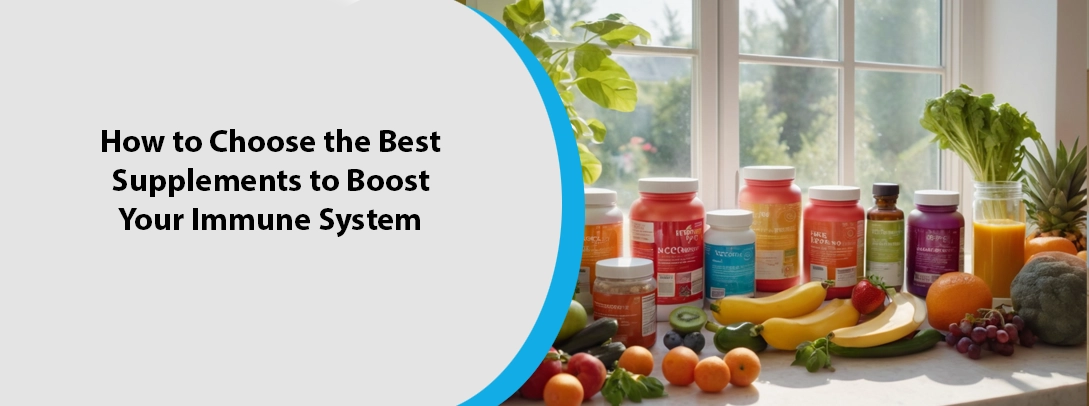In today’s fast-paced world, maintaining a strong immune system is more important than ever. With increasing exposure to stress, environmental toxins, and illness, many individuals are turning to supplements to support their immune health. However, with countless options available on the market, it can be overwhelming to determine which supplements are the most effective. This guide will help you understand how to choose the best supplements to boost your immune system.
1. Understanding the Immune System
1.1 What is the Immune System?
The immune system is a complex network of cells, tissues, and organs that work together to defend the body against harmful pathogens such as bacteria, viruses, and parasites. A healthy immune system is essential for preventing infections and maintaining overall health.
1.2 Factors Affecting Immune Health
Various factors can influence the strength of the immune system, including:
- Diet: Nutrient-rich foods are crucial for supporting immune function.
- Stress: Chronic stress can weaken the immune response.
- Sleep: Quality sleep is vital for immune health.
- Physical Activity: Regular exercise can enhance immune function.
2. Key Nutrients for Immune Support
Before choosing supplements, it’s essential to understand the key nutrients that play a role in immune health.
2.1 Vitamin C
Vitamin C is a powerful antioxidant that helps stimulate the production of white blood cells, which are vital for fighting infections.
- Sources: Citrus fruits, strawberries, bell peppers, and broccoli.
- Supplementation: Consider taking vitamin C supplements, especially during cold and flu season.
2.2 Vitamin D
Vitamin D is crucial for immune function, and deficiencies have been linked to an increased susceptibility to infections.
- Sources: Sunlight, fatty fish, and fortified dairy products.
- Supplementation: Many people may require vitamin D supplements, particularly in winter months or for those with limited sun exposure.
2.3 Zinc
Zinc is essential for the development and function of immune cells. It has been shown to reduce the duration and severity of colds.
- Sources: Meat, shellfish, legumes, and seeds.
- Supplementation: Zinc lozenges can be effective for short-term immune support.
2.4 Elderberry
Elderberry is a popular herbal supplement known for its antiviral properties. It may help reduce the duration and severity of cold and flu symptoms.
- Sources: Elderberry syrup or gummies.
- Supplementation: Consider elderberry supplements, especially during cold and flu season.
2.5 Probiotics
Probiotics are beneficial bacteria that support gut health, which plays a significant role in immune function.
- Sources: Yogurt, kefir, sauerkraut, and other fermented foods.
- Supplementation: Choose a high-quality probiotic supplement to support digestive and immune health.
3. Choosing the Right Supplements
3.1 Research the Brand
When selecting supplements, it’s crucial to choose reputable brands that adhere to quality standards. Look for:
- Third-party testing: This ensures the supplement contains what it claims and is free from harmful contaminants.
- Transparent labeling: Ingredients and dosages should be clearly stated on the label.
3.2 Read Reviews and Testimonials
Before purchasing a supplement, read reviews and testimonials from other users. This can provide insights into the effectiveness and potential side effects of the product.
3.3 Check for Allergens and Additives
Always check the ingredient list for potential allergens or unnecessary additives. Opt for supplements that are free from artificial colors, flavors, and preservatives.
3.4 Consult a Healthcare Professional
Before starting any new supplement regimen, it’s advisable to consult with a healthcare professional, especially if you have underlying health conditions or are taking medications. They can provide personalized recommendations based on your specific health needs.
4. Lifestyle Factors to Enhance Immune Health
While supplements can provide additional support, it’s essential to adopt a holistic approach to immune health. Consider the following lifestyle factors:
4.1 Maintain a Balanced Diet
Focus on a diet rich in whole foods, including fruits, vegetables, whole grains, lean proteins, and healthy fats. This provides the necessary nutrients to support immune function.
4.2 Stay Hydrated
Drinking plenty of water is vital for overall health, including immune health. Aim for at least 8 glasses of water a day.
4.3 Manage Stress
Implement stress-reducing techniques such as mindfulness, meditation, yoga, or deep-breathing exercises to support immune health.
4.4 Prioritize Sleep
Ensure you get enough quality sleep each night, as sleep is essential for a well-functioning immune system. Aim for 7-9 hours of sleep per night.
4.5 Regular Physical Activity
Engage in regular physical activity, such as walking, running, or strength training, to enhance immune function and overall health.
5. Conclusion
Choosing the best supplements to boost your immune system involves understanding the key nutrients that support immune health, researching reputable brands, and considering your unique health needs. While supplements can be beneficial, they should complement a balanced diet and a healthy lifestyle. By prioritizing your health and making informed choices, you can enhance your immune system and promote overall well-being.

Leave a Reply